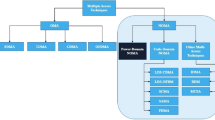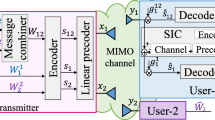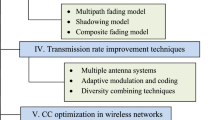Abstract
This paper proposes a link adaptation algorithm for cooperative transmissions in the down-link connection of an OFDMA-based wireless system. The algorithm aims at maximizing the spectral efficiency of a relay-aided communication link, while satisfying the block error rate constraints at both the relay and the destination nodes. The optimal solution would be to perform an exhaustive search over a high-dimensional space determined by all possible combinations of modulations, code rates and information block lengths on the individual channels of the cooperative link; clearly, such an approach has an intractable complexity. Our solution is to use a link performance prediction method and a trellis diagram representation such that the resulting algorithm outputs the link configuration that conveys as many information bits as possible and also fulfilling the block error rate constraints. The proposed link adaptation algorithm has linear complexity with the number of available resource blocks, while still provides a very good performance, as shown by simulation results.












Similar content being viewed by others
Notes
Recall that the use of a direct or cooperative transmission depends on the relay activation decision.
References
3GPP (2011). Evolved universal terrestrial radio access (e-utra); multiplexing and channel coding.
Alonso-Zrate, J., Kartsakli, E., Alonso, L., Katz, M., Verikoukis, C. (2011). Multi-radio cooperative arq in wireless cellular networks: A mac layer perspective. Telecommunication Systems. Springer, New York (Special issue on “challenges in Next-Generation and Resource-Constrained networks”).
Amyot, D., & Eberlein, A. (2003). An evaluation of scenario notations and construction approaches for telecommunication systems development. Telecommunication Systems, 24, 61–94. doi:10.1023/A3A1025890110119.
Badiu, M.A., Varga, M., Bota, V. (2010). Link performance prediction methods for cooperative relaying in wireless networks. In Proceedings of international symposium on wireless communication systems (ISWCS) pp. 556–560.
Caire, G., Taricco, G., & Biglieri, E. (1998). Bit-interleaved coded modulation. IEEE Transactions on Information Theory, 44(3), 927–946.
Kramer, G., Gastpar, M., & Gupta, P. (2005). Cooperative strategies and capacity theorems for relay networks. IEEE Transactions on Information Theory, 51(9), 3037–3063.
Pabst, R., Walke, B., Schultz, D., et al. (2004). Relay-based deployment concepts for wireless and mobile broadband radio. IEEE on Communications Magazine, 42(9), 80–89.
Sayana, K., Zhuang, J., Stewart, K. (2008). Short term link performance modeling for ML receivers with mutual information per bit metrics. In Global telecommunications conference, IEEE GLOBECOM 2008 (pp. 1–6).
Srinivasan, R., Jallou, L., Novak, R., Park, J. (2009). IEEE 802.16m evaluation methodology document (EMD). Standard IEEE 802.16m-08/004r5, IEEE 802.16 broadband wireless access working group.
Stiglmayr, S., Bossert, M., & Costa, E. (2008). Mutual-information-based adaptive coding and modulation in bit-interleaved OFDM systems using punctured LDPC codes. European Transactions on Telecommunications, 19(7), 801–811.
Stuckmann, P. (2002). Quality of service management in gprs-based radio access networks. Telecommunication Systems 19, 515–546. doi:10.1023/A:1013811026373.
Varga, M., Badiu, M.A., Bota, V. (2012). Link adaptation algorithm for distributed coded transmissions in relay-aided ofdma systems. In 35th International conference on telecommunications and signal processing (TSP), 2012 (pp. 201–206). doi:10.1109/TSP.2012.6256282.
Yan, L., & William, E. R. (2007). Mutual-information-based adaptive bit-loading algorithms for LDPC-coded OFDM. IEEE Transactions on Wireless Communications, 6(5), 1670–1680.
Zimmermann, E., Herhold, P., & Fettweis, G. (2005). On the performance of cooperative relaying protocols in wireless networks. European Transactions on Telecommunications, 16, 5–16.
Acknowledgments
The work of M. Varga was supported by the project “Development and support of multidisciplinary postdoctoral programmes in major technical areas of national strategy of Research - Development - Innovation” 4D-POSTDOC, contract no. POSDRU/89/1.5/S/52603, project co-funded by the European Social Fund through Sectoral Operational Programme Human Resources Development 2007–2013. The work of M.A. Badiu was supported in part by the project SIDOC under Contract POSDRU/88/1.5/S/60078”.
Author information
Authors and Affiliations
Corresponding author
Rights and permissions
About this article
Cite this article
Varga, M., Badiu, MA. & Bota, V. Link adaptation algorithm for distributed coded transmissions in cooperative OFDMA systems. Telecommun Syst 59, 477–489 (2015). https://doi.org/10.1007/s11235-014-9908-1
Published:
Issue Date:
DOI: https://doi.org/10.1007/s11235-014-9908-1




